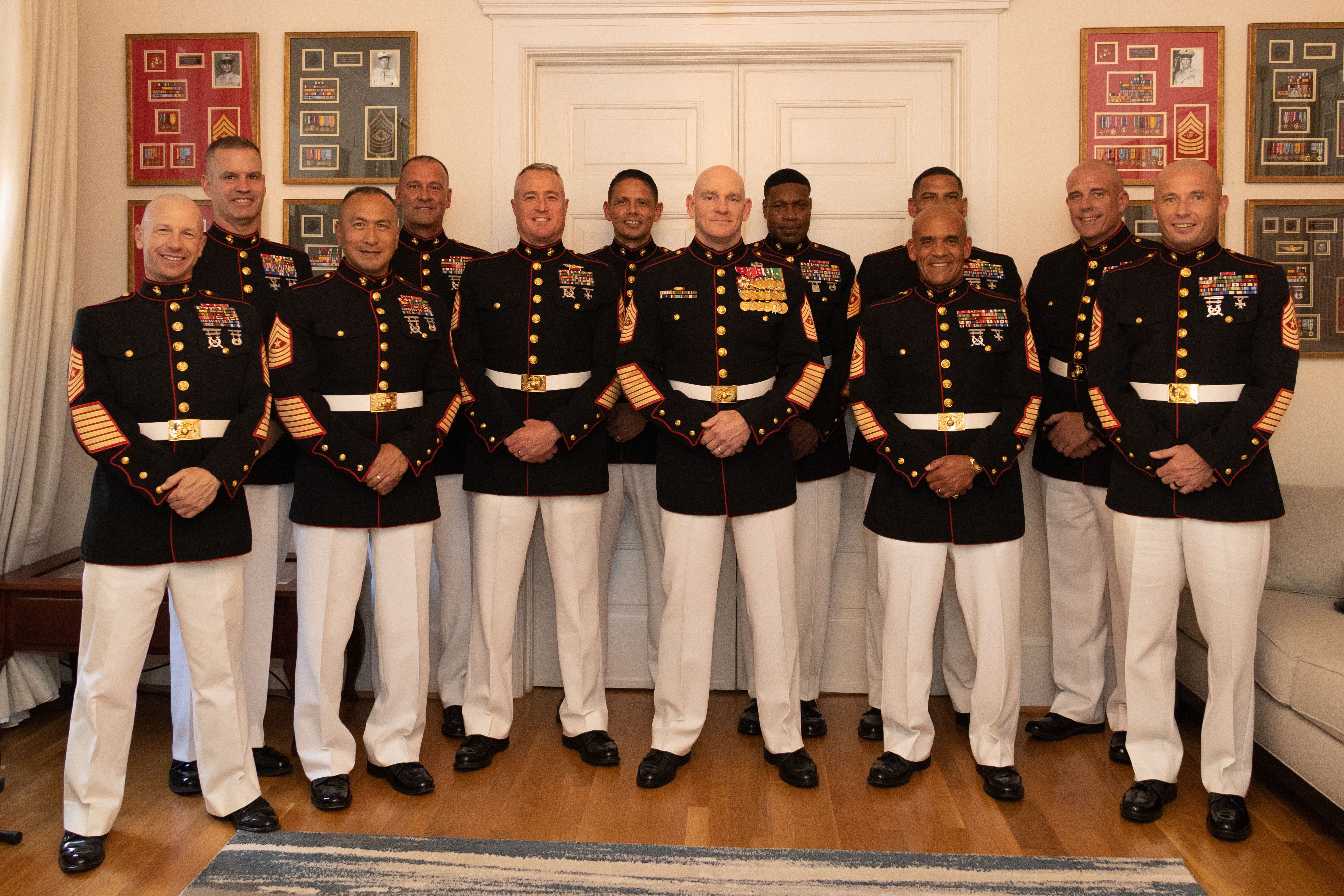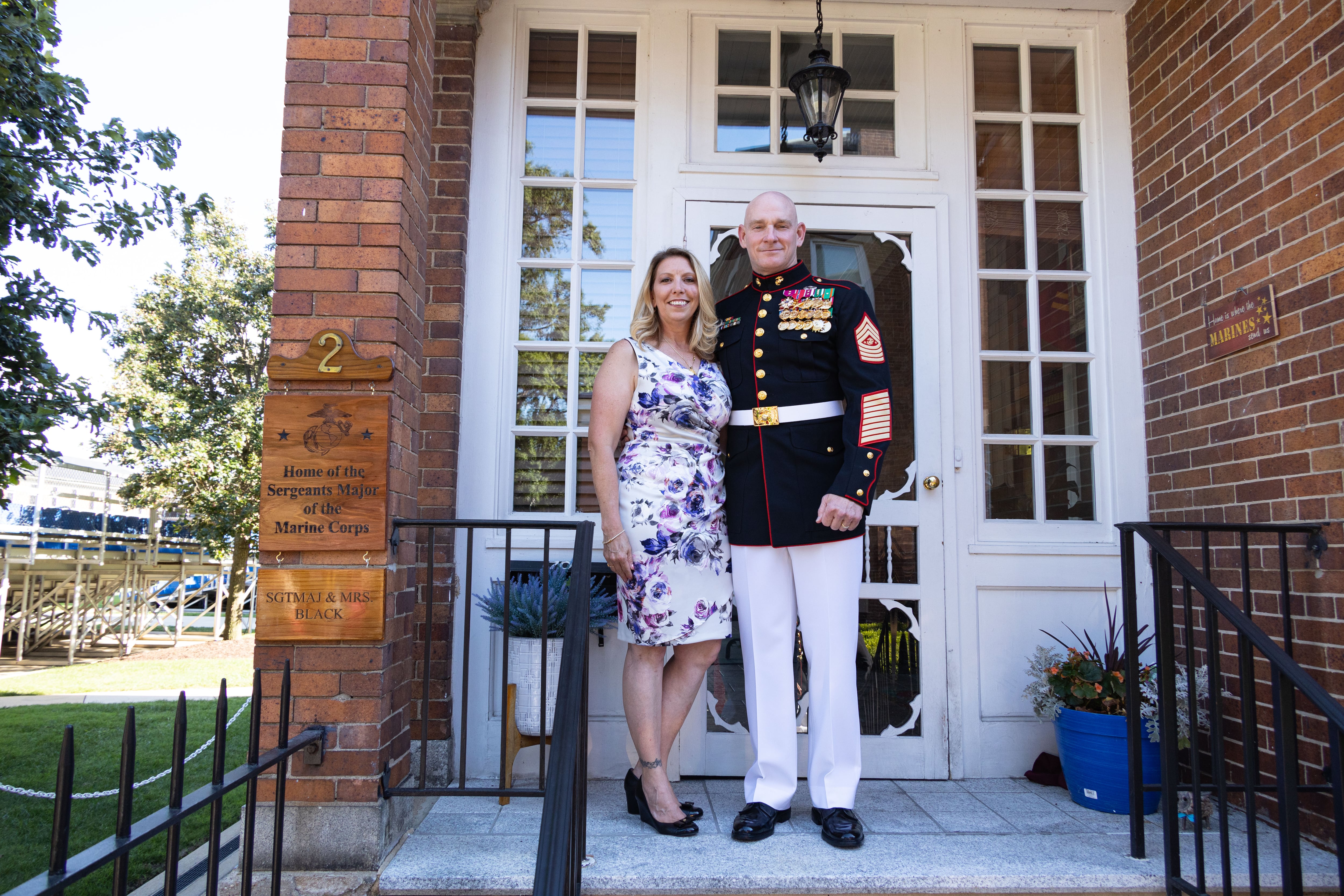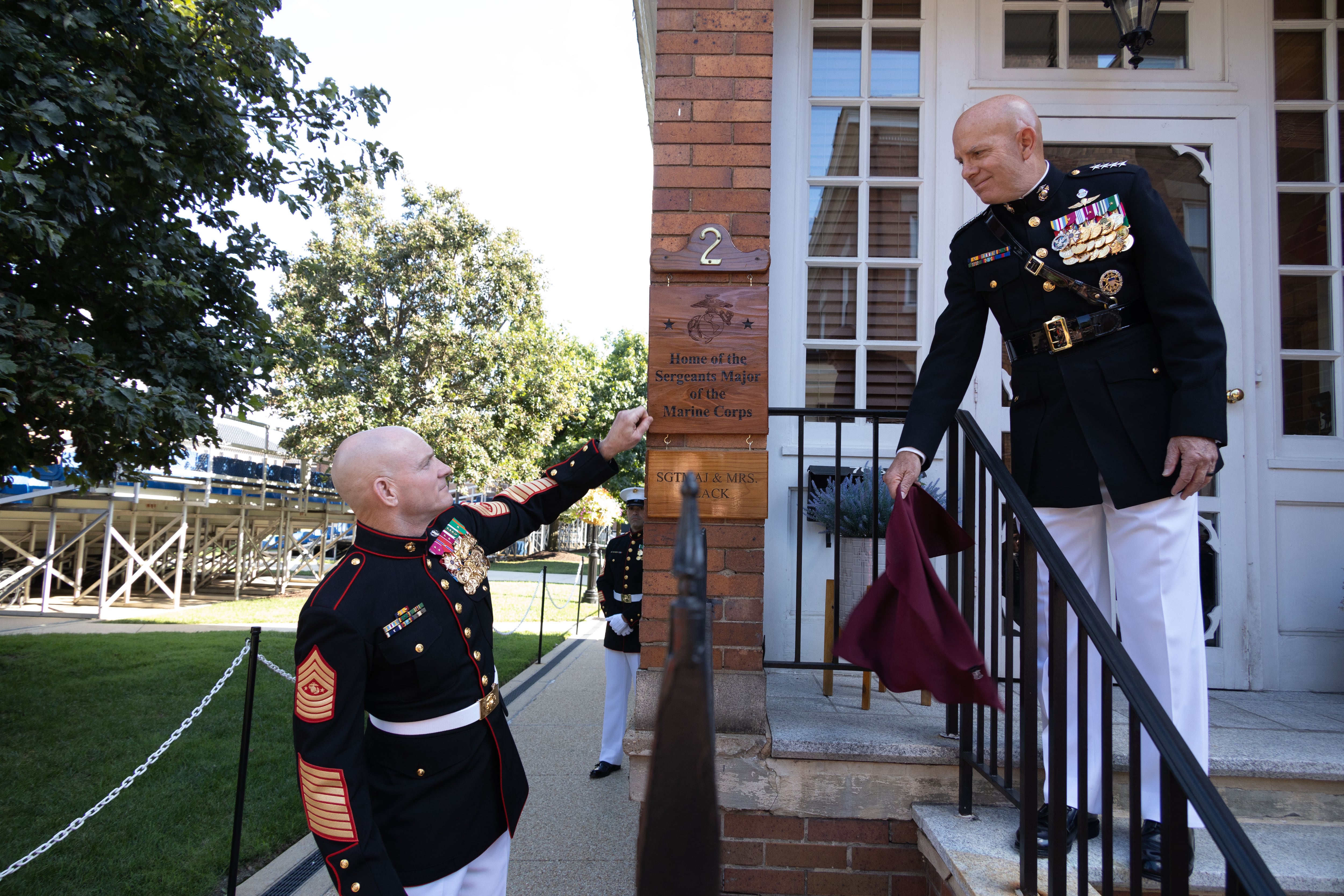MARINE BARRACKS, Washington ― In mid-1979, Sergeant Major of the Marine Corps John R. Massaro had an assignment.
His boss, then-Commandant of the Marine Corps Gen. Robert Barrow, had tasked his senior enlisted officer with delivering recommendations before the senior enlisted Marine’s fast-approaching retirement.
The now 92-year-old, 8th Sergeant Major of the Marine Corps shared this story in a letter to the current 19th Sergeant Major of the Marine Corps Troy Black. Black read the letter aloud in the parlor of his home here on Aug. 12.
“I suggested five in writing,” Massaro wrote. “No. 1 was quarters for the Sergeant Major of the Marine Corps at 8th & I,” Masaro wrote. “I suggested that those quarters reside just inside the gate currently where the officer’s club is.”
The term 8th & I is a common reference to the Marine Barracks, Washington, historic home of Marine Corps top leadership and the Silent Drill Platoon. The term references the intersection of two streets in Washington, D.C.
Masaro had met with Barrow to go over that and other recommendations. The general had listened. But alas, no home for the senior enlisted Marine.
Until now.
Eleven sergeants major of the Marine Corps and 43 years later, the house where Black and his wife have lived for the past three years of his tenure was dedicated as the “Home of the Sergeants Major of the Marine Corps.”
RELATED

It’s close enough to the Home of the Commandants here to hit with a rock. The house isn’t quite as large as the commandant’s 15,000 square foot, 30-room, Georgian-Federalist style house, though.
That house was built on this site in 1806, five years after President Thomas Jefferson selected the location for the headquarters of the Marine Corps while riding on horseback through the area with the Corps’ second commandant, Lt. Col. William Ward Burrows.
But “house” might not be the right descriptor, at least not for Marines, based on comments made by current Commandant Gen. David Berger, during a reception in the parlor of the building moments before its official dedication.
“A house is a house,” Berger said. “A home is a whole other thing.”
“They have a White House,” Berger said. “Where the (Chief of Naval Operations) lives is the Tingey House.”
The Tingey House is at the Washington Navy Yard.
The chief of staff of the Air Force lives at the Air House, Fort Myers, Virginia; the chief of staff of the Army lives at Quarters 1, Joint Base Myer-Henderson Hall, Virginia.
“The commandant lives in a home,” Berger said. “This is the Sergeant Major of the Marine Corps’ home.”
“I bring that up because homes are where I was raised. Homes are where families gather,” Berger said. “This is where Marines will gather. Where the family will live, this is the place where all kinds of gatherings will happen over the next 200 years.”
Crowded into the home’s parlor, members of the Marine Corps Band played a welcoming song, a singer belting out, “Old Time Rock and Roll,” by Bob Seger and the Silver Bullet Band.
Shoulder to heavily-striped shoulder, a cluster of sergeants major, colonels and general officers, including the commandant and assistant commandant, sipped ice water as they awaited the ceremony and the follow-on evening parade by the Silent Drill Platoon, performed by an all-enlisted crew, a once-a-season event.
“This is a representation to the enlisted Marines of their significance and importance to our Corps,” Black told the crowd. “We have lived here, but now we make this our home.”

Black noted the playing of colors each morning, the sight of the Silent Drill Platoon and Marine Corps Band practicing on the parade deck as markers of the history and legacy of this long-standing center of Marine leadership.
The sergeant major and his wife, Stacie, lived in the residence for the past three years. He had discussed making this residence the official home with Berger early in his time in the position, he told the crowd.
But Black’s experience has not been the norm.
Past sergeants major have lived at locations that range across the Washington, D.C., and northern Virginia area since the position was created in 1957, the first permanent senior enlisted adviser position among the four military services.
The other services established their own senior enlisted positions years later. The Army followed suit in 1966 with the Navy and The Air Force did the same in 1967.
None have a permanent residence adjacent to their top officer, officials said.
Some of the past residences of the top enlisted Marine included Fort Belvoir, Virginia, an Army installation, the Naval Annex outside Fort Myer, Virginia, and on the campus of the National Defense University, on 5th Avenue Southwest in Washington, D.C.

When Sergeant Major of the Marine Corps Lewis Lee served in the position from 1995–1999 under Commandant Gen. Charles Krulak, he lived on the site of the former Defense Information Systems Agency near the Pentagon in Arlington, Virginia.
That location was convenient to get to work, Lee told Marine Corps Times at the dedication event, but not in his boss’ backyard.
Until Black read Massaro’s letter about his 1979 request before the dedication, Lee didn’t know about that history.
“I never thought about it, never asked about it,” Lee said. “There’s no reason to think that Commandant Krulak wouldn’t have done the same thing for me.”
But Lee saw this event as significant.
“It’s like a beacon of a type,” Lee said. “I think it says that the top-level leadership of the Marine Corps and the top-level enlisted leadership are a team, truly a team. This is just another strengthening of that ideal. That the team archives more than just two individuals working toward the same goal.”
Todd South has written about crime, courts, government and the military for multiple publications since 2004 and was named a 2014 Pulitzer finalist for a co-written project on witness intimidation. Todd is a Marine veteran of the Iraq War.




